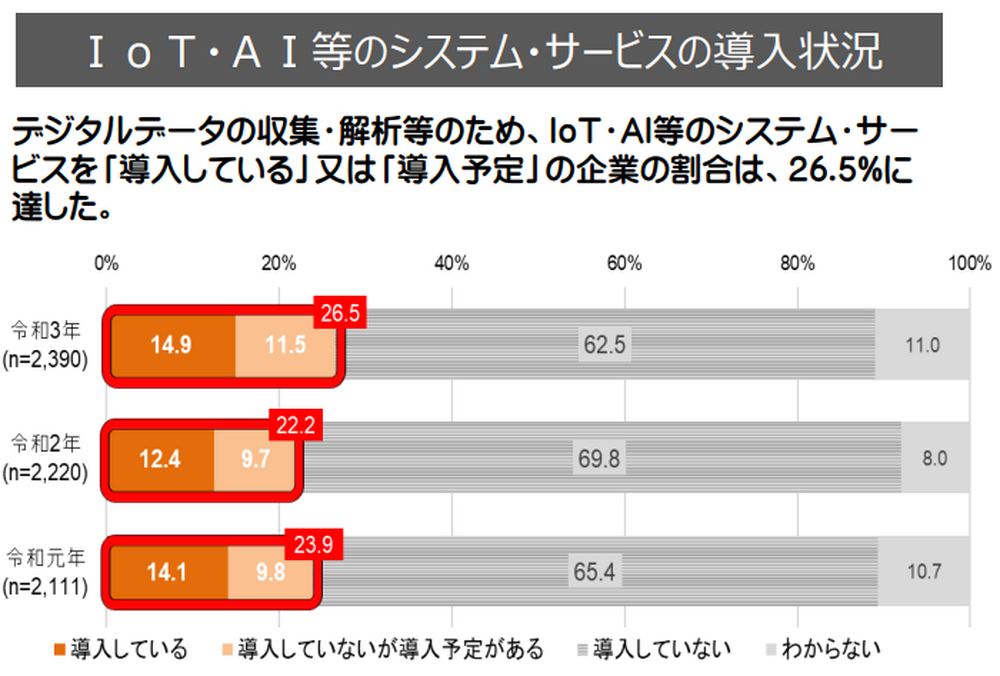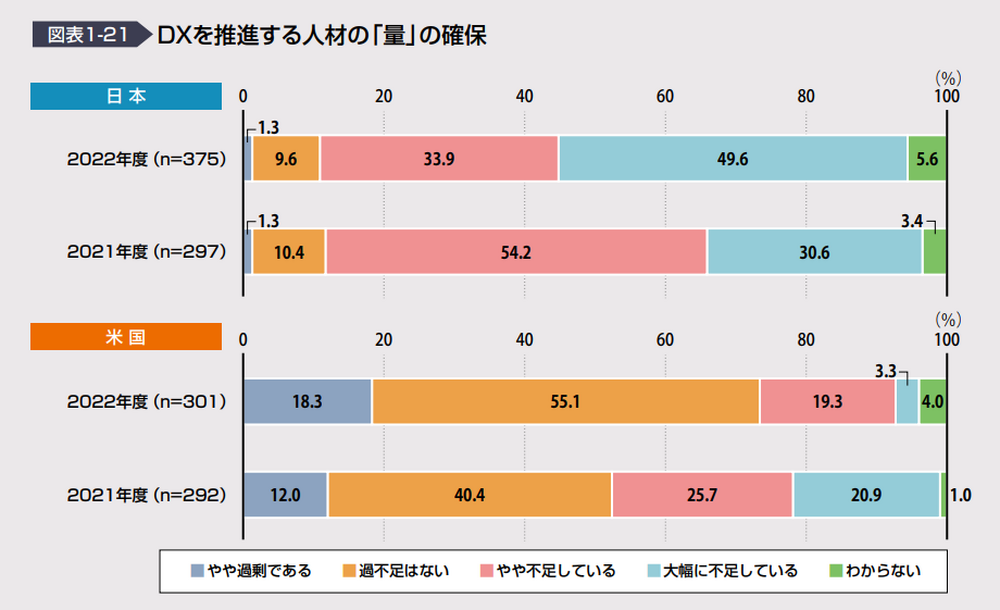多岐にわたる分野でビッグデータの活用が拡大しており、それに伴いデータサイエンティストの需要も年々高まっています。こういった背景から、今後データサイエンティストへの転職を検討している方も多いのではないでしょうか。
そこで今回は、データサイエンティストの将来性について解説していきます。記事内では、データサイエンティストに必須のスキルや向いている人の特徴も紹介しているので、ぜひ参考にしてください。

多岐にわたる分野でビッグデータの活用が拡大しており、それに伴いデータサイエンティストの需要も年々高まっています。こういった背景から、今後データサイエンティストへの転職を検討している方も多いのではないでしょうか。
そこで今回は、データサイエンティストの将来性について解説していきます。記事内では、データサイエンティストに必須のスキルや向いている人の特徴も紹介しているので、ぜひ参考にしてください。
The use of big data is expanding in a wide variety of fields, and the demand for data scientists is increasing year by year. Against this backdrop, many people may be considering a career change to data scientist in the future.
In this article, we will discuss the future of data scientists. The article also introduces the essential skills and characteristics of people who are suited for data scientist.

まず、データサイエンティストの将来が明るいといわれている理由には、以下3つの背景があります。
1つずつ見ていきましょう。
昨今、企業におけるビッグデータの経営への活用が盛んになっています。この背景から、ビッグデータを扱うことができるデータサイエンティストの将来性は明るく、需要が増加し、高い収入が期待される職種といえます。
最近では、さまざまな産業で業務効率の向上や顧客サービスの向上を目的に、ビッグデータを使ったデジタル化への取り組みが拡大しています。
総務省が公開している「令和3年通信利用動向調査の結果」によれば、2021年時点でデジタルデータの収集・解析を行うシステムやサービスを導入している、あるいは導入予定の企業は26.5%に上り、2019年の23.9%、2020年の22.2%から増加していることが示されています。

ビッグデータは、今後も幅広い分野での利用が見込まれており、その活用により新しい事業の開発や異業種間の連携などが進められることが期待されています。
AI技術の進歩により、IoTデバイスやセンサーが普及し、収集されるデータの量が急速に増加しています。従来の構造化データだけでなく、画像や音声、テキストといった非構造化データの量も増え続けています。これらのデータは複雑さを増しており、従来の統計分析手法では対応しきれません。
この複雑なデータを分析するためには、ディープラーニングなどのAIモデルが必要とされています。AIモデルは従来の手法よりも高い精度でデータを分析できますが、その開発や運用にはデータの収集、前処理、モデル構築、評価、管理などの専門知識を持つデータサイエンティストが欠かせないのです。
AI技術の進歩により、データサイエンティストの仕事が奪われるという見方もありますが、AIはあくまでデータ分析を効率化し、精度を高めるツールであり、データサイエンティストの仕事を完全に取って代わることはありません。
適切なAIモデルの選定、学習可能な質の高いデータの準備、分析結果をビジネスへ適用する解釈などは、今のところ人間にしかできない仕事です。将来的にデータサイエンティストの仕事内容が変化することはあっても、この職種自体がなくなるわけではありません。むしろ、人間をサポートする技術として、AIと共存していくと考えられています。
デジタル化が進展するなかで、AIやデータ解析を専門とするデジタル分野の人材不足が深刻な問題になっています。
情報処理推進機構(IPA)が発表した「DX白書2023」によると、DXを進める上で必要なデジタル人材が「大幅に不足している」と答えた企業は49.6%に上りました。「やや不足している」と答えた企業を含めると、80%を超える企業がデジタル人材の不足に頭を悩ませている状況です。

デジタル変革の推進役であるデータサイエンティストも含め、専門人材が不足しているのが実情です。
デジタル技術の進展と、それに伴うデジタル人材の需要の高まりを背景に、経済産業省は、データサイエンティストをはじめとするデジタル人材の育成に注力しています。
具体的に、経済産業省はデジタル人材を育成するための具体策としてロードマップを作成し、教育プログラムや研究機関への支援を行っています。また、文部科学省が主導する「数理・データサイエンス・AI教育プログラム認定制度」が2019年から始まり、大学や専門学校における専門教育が推進されています。
実際に、滋賀大学や横浜市立大学、早稲田大学などの一部の大学では、データサイエンスに特化した学部や研究科を開設し、データサイエンティストの育成に前向きに取り組んでいるのです。
こうした取り組みにより、データサイエンティストという職種を目指す人材は年々増加傾向にあります。しかし、デジタル人材の不足は依然として深刻な課題となっており、データサイエンティストの需要は今後も高まると見込まれています。

First, there are three reasons why the future of data scientists is bright
Let's look at them one by one.
In recent years, the use of big data for management in companies has become more active. Against this backdrop, the future of data scientists who can handle big data is bright, and the demand for this type of work is increasing and high income is expected.
Recently, various industries are expanding their digitalization efforts using big data to improve operational efficiency and customer service.
According to the "Results of the 2021 Telecommunications Usage Trends Survey" published by the Ministry of Internal Affairs and Communications, 26.5% of companies have introduced or plan to introduce systems or services to collect and analyze digital data by 2021, up from 23.9% in 2019 and 22.2% in 2020. The figure is up from 23.9% in 2019 and 22.2% in 2020.

(Reference: Ministry of Internal Affairs and Communications, "Results of the 2021 Telecommunications Usage Trends Survey")
Big data is expected to be used in a wide range of fields in the future, and its utilization is expected to promote the development of new businesses and collaboration among different industries.
Advances in AI technology have led to the widespread use of IoT devices and sensors, and the volume of data collected is rapidly increasing. In addition to traditional structured data, the volume of unstructured data such as images, voice, and text continues to grow. These data are becoming increasingly complex and cannot be handled by traditional statistical analysis methods.
AI models such as deep learning are needed to analyze this complex data, and while AI models can analyze data with greater accuracy than traditional methods, their development and operation requires data scientists with expertise in data collection, preprocessing, model building, evaluation, and management. They are indispensable.
Some believe that advances in AI technology will take away the work of data scientists, but AI is only a tool to improve the efficiency and accuracy of data analysis and will never completely replace the work of data scientists.
Selecting appropriate AI models, preparing high quality data that can be trained, and interpreting the results of the analysis to apply to business are tasks that can only be done by humans at this time. While the job description of data scientists may change in the future, the profession itself will not disappear. Rather, it is expected to coexist with AI as a technology that supports humans.
As digitization progresses, the shortage of human resources in the digital field specializing in AI and data analysis has become a serious problem.
According to the "DX White Paper 2023" published by the Information-technology Promotion Agency, Japan (IPA), 49.6% of companies answered that they have a "significant shortage" of digital human resources needed to advance DX. Including companies that answered that there is a "slight shortage," more than 80% of companies are concerned about the shortage of digital human resources.

Reference: Information-technology Promotion Agency, Japan (IPA), "DX White Paper 2023
The reality is that there is a shortage of specialized human resources, including data scientists, who are the drivers of digital transformation.
Against the backdrop of the advancement of digital technology and the accompanying increase in demand for digital human resources, the Ministry of Economy, Trade and Industry (METI) is focusing its efforts on the development of digital human resources, including data scientists.
Specifically, METI has created a roadmap as a concrete measure to develop digital human resources and is providing support for educational programs and research institutions. In addition, the Ministry of Education, Culture, Sports, Science and Technology (MEXT)-led "Accreditation System for Education Programs in Mathematics, Data Science, and AI" will begin in 2019, promoting specialized education at universities and technical colleges.
In fact, some universities, such as Shiga University, Yokohama City University, and Waseda University, have established faculties and graduate schools specializing in data science and are making positive efforts to train data scientists.
As a result of these efforts, the number of people aspiring to the data scientist profession is increasing every year. However, the shortage of digital human resources remains a serious issue, and the demand for data scientists is expected to continue to grow.

ここからは、データサイエンティストの将来性に関してよくある疑問にお応えします。
近年、大量のデータを扱うデータサイエンティストの仕事がAIによって置き換えられるかもしれないという話題が頻繁に取り沙汰されています。実際に、データの収集や処理、分析を行うことは、現代のAIにとって比較的容易な作業です。このような技術進歩により、一部の作業が自動化される可能性は否定できません。
ただし、データサイエンティストの仕事は、データの集計や分析だけではありません。課題の特定から分析モデルの作成、分析結果をもとにしたビジネス提案まで、幅広い業務を担当します。これらの業務をこなすためには、データの背後にある意味を読み解き、それをビジネス価値に変換する能力が求められるため、現時点でAIが完全に代替することは難しいとされています。
そのため、この職種に対する需要がすぐになくなることはないと考えてよいでしょう。
データサイエンティストの需要は年々高まっていますが、業務の細分化が進むことにより、将来的に現在の仕事がなくなる可能性も指摘されています。
ビックデータの活用が注目され始めたのは近年になってからで、データサイエンティストという職種自体も歴史が浅いため、これまでは業務範囲が定義されていない状況で働いているケースが少なくありませんでした。
しかし昨今、データサイエンス分野に従事する人が増え、専門性の高まりと経験の蓄積に伴い、業務をより効率的に行うために細分化が進んでいます。こうした業務の細分化により新たな職種が生まれれば、従来のデータサイエンティストのイメージと異なる仕事をする可能性もあり得るでしょう。
教育機関などで専門知識を身につけたデータサイエンティストが増加するにつれ、スキルの低いデータサイエンティストの市場での立場は危うくなると考えられます。
現在は人材不足が叫ばれているデータサイエンス分野ですが、これから先、十分な知識・スキルを持つ人材が育成されれば、採用市場は変化し、企業はより高度なスキルを持つ人材を選び始めるでしょう。
そのため、需要が高い職種とはいえ、個々のスキルレベルによっては将来が必ずしも保証されるわけではありません。変化する市場のなかでも価値ある人材として求められるには、技術の進歩や市場のニーズに合わせてスキルを更新し続ける姿勢が大切です。

Here are some answers to common questions about the future of data scientists.
In recent years, there has been frequent talk about how AI may replace the work of data scientists who handle large amounts of data. Indeed, collecting, processing, and analyzing data is a relatively easy task for modern AI. The possibility that such technological advances will automate some of these tasks cannot be ruled out.
However, the work of a data scientist is not limited to data aggregation and analysis. They are responsible for a wide range of tasks, from identifying issues to creating analytical models and making business proposals based on the analysis results. In order to perform these tasks, the data scientist must be able to decipher the meaning behind the data and convert it into business value, which is why it is difficult to be completely replaced by AI at this point in time.
Therefore, it is safe to assume that demand for this type of work will not disappear anytime soon.
Although the demand for data scientists is increasing year by year, it has been pointed out that the current jobs may disappear in the future due to the increasing fragmentation of the work.
The use of big data has only begun to attract attention in recent years, and because the data scientist position itself has a short history, there have been many cases of people working in situations where the scope of their work has not been defined.
Recently, however, the number of people working in the data science field has been increasing, and with the rise in specialization and the accumulation of experience, work has been subdivided to make it more efficient. If new job titles are created as a result of this segmentation of work, it is possible that the work may differ from the traditional image of a data scientist.
As the number of data scientists who have acquired specialized knowledge at educational institutions increases, the market position of low-skilled data scientists will be in jeopardy.
Although there is currently a shortage of human resources in the data science field, if enough people with sufficient knowledge and skills are developed in the future, the hiring market will change and companies will begin to select people with more advanced skills.
Therefore, even though the occupations are in high demand, the future is not necessarily guaranteed, depending on individual skill levels. In order to remain valuable and sought after in a changing market, it is important to keep updating your skills to keep up with technological advances and market needs.

データサイエンティストに求められる知識・スキルには、以下6つが挙げられます。
1つずつ解説していきます。
データサイエンティストの仕事では、通常のデータではなく「ビッグデータ」と呼ばれる膨大な量のデータを扱うことが一般的です。ビッグデータはその名のとおり、普通のデータに比べて非常に大きな容量を持ち、このデータの収集、保管、処理には専門的な技術が求められます。
とくにHadoopや、それに関連するHBase、Hive、Pigなどのオープンソースソフトウェアに関する知識がしばしば必要になります。ビッグデータ技術は進化が早く、今後も新しい発展が期待されるため、常に最新の情報を得るために積極的に情報収集を行うことが大切です。
機械学習は、コンピューターに大量のデータから学習させ、分類や予測といったタスクを自動で行うアルゴリズムやモデルを構築する技術です。この技術により、短時間で大量のデータ分析を行えるため、データサイエンティストにとって欠かせない知識の1つといえます。
そして、この機械学習をデータ分析に応用するためには、その実装方法に関する知識も必要です。具体的には、教師あり学習や教師なし学習、強化学習、深層学習など、機械学習の各手法の特徴を理解し、状況に応じて適切に使い分けられるようにしておく必要があります。
データサイエンティストは統計学に関する知識も必須です。データは常に不確実性やばらつき、誤差が含まれているため、単にそれを眺めているだけでは有益な知見は得られません。このようなばらつきのあるデータを分析し、その結果を正しく解釈するためには、統計学的手法を用いて規則性・不規則性を導き出す必要があります。
具体的には、データの傾向や分布を把握し、平均や分散などの指標を算出することで、データの本質を明らかにできます。また、特異点の有無を検出したり、カテゴリ分けを行ったりすることで、データに潜む隠れたパターンを見つけ出すことも可能です。
このように、統計学はデータ分析のあらゆる段階において必要不可欠な学問であるといえるでしょう。
データ分析を行う際、一般的には適切な分析モデルを選択して作業を進めます。そのため、データサイエンティストは分析に適した統計処理技術やデータマイニングの手法についての知識も求められます。
データマイニングとは、大量のデータから隠れたパターンや傾向を見つけ出し、新たな知識や価値ある知見を発見する技術です。
データの分析にはさまざまな手法がありますが、問題に最適な解を導き出すためには、どの手法が最も適切かを正確に判断しなければなりません。理解し、適用できる分析手法の範囲が広いほど、より適した手法を選択できる可能性が高まるでしょう。
データサイエンティストの役割は、ビジネスの問題を特定し解決策を模索することや、新たなビジネスチャンスにつながる情報を見つけ出すことです。
そのため、問題の根本原因を追求したり、データ分析を通じて得た洞察をもとに適切な提案を行ったりする上では、コンサルティングスキルが欠かせません。コンサルティングスキルには主に、論理的思考力、課題解決能力、ヒアリング能力、プレゼンテーション能力、ビジネスの理解力などがあります。
これらのスキルを短期間で身につけるのは難しいため、日々の業務を通じて習得しておく必要があるでしょう。
データサイエンティストの業務では、膨大なデータを効率よく扱うために、専門の分析ツールを頻繁に使用します。分析作業中、複雑な計算が必要になることが多く、これらのツールを使うことで計算作業を効率化できます。
たとえば、Excelで行える回帰分析などの基本的な分析手法もありますが、専門的な分析ではオープンソースソフトウェアのRがよく使われます。また、規模の大きい会社ではSPSSなどの高度な分析環境が用意されているケースもあります。
データ分析を行う上では、これらのツールを熟知し、使いこなせるスキルが求められます。ツールを効率的に使用できないとデータ分析が困難になることもあるため、スムーズに作業を進めるには欠かせないスキルです。
各企業で使用されているツールは異なるため、すべてのツールをマスターする必要はありませんが、主要なツールには慣れておくようにしましょう。

The knowledge and skills required of a data scientist include the following six
We will explain one by one.
Data scientists generally work with huge amounts of data, known as "big data," rather than ordinary data. As the name suggests, big data has a very large volume compared to ordinary data, and collecting, storing, and processing this data requires specialized skills.
In particular, knowledge of Hadoop and related open source software such as HBase, Hive, and Pig is often required. Big data technology is evolving quickly and new developments are expected in the future, so it is important to actively gather information to stay up-to-date.
Machine learning is a technology that allows computers to learn from large amounts of data and build algorithms and models that automatically perform tasks such as classification and prediction. This technology enables the analysis of large amounts of data in a short period of time, and is therefore an indispensable knowledge for data scientists.
In order to apply machine learning to data analysis, knowledge of how to implement it is also necessary. Specifically, it is necessary to understand the characteristics of each method of machine learning, such as supervised learning, unsupervised learning, reinforcement learning, and deep learning, and to be able to use them appropriately depending on the situation.
Data scientists must also have knowledge of statistics. Data is always subject to uncertainty, variation, and error, and simply looking at it does not provide useful insights. In order to analyze data with such variability and correctly interpret the results, statistical methods must be used to derive regularities and irregularities.
Specifically, the nature of the data can be clarified by identifying trends and distributions in the data and calculating indices such as mean and variance. It is also possible to find hidden patterns in the data by detecting the presence or absence of singularities and categorizing the data.
Thus, statistics is an essential discipline for all phases of data analysis.
When conducting data analysis, one generally selects an appropriate analytical model to work with. Therefore, data scientists must also be knowledgeable about statistical processing techniques and data mining methods appropriate for analysis.
Data mining is a technique for finding hidden patterns and trends in large amounts of data to discover new and valuable knowledge.
While there are many different methods for analyzing data, one must accurately determine which method is most appropriate to derive the best solution to a problem. The greater the range of analytical techniques you understand and can apply, the more likely you will be able to select the more appropriate method.
The role of a data scientist is to identify and seek solutions to business problems and to find information that can lead to new business opportunities.
Therefore, consulting skills are essential in pursuing the root causes of problems and making appropriate recommendations based on insights gained through data analysis. Consulting skills mainly include logical thinking, problem-solving skills, listening skills, presentation skills, and business understanding.
These skills are difficult to acquire in a short period of time, so it is necessary to learn them through daily work.
Data scientists frequently use specialized analytical tools in their work to efficiently handle vast amounts of data. During analysis, complex calculations are often required, and these tools can streamline the calculation process.
For example, there are basic analysis methods such as regression analysis that can be done in Excel, but for specialized analysis, the open source software R is often used. In some cases, larger companies have advanced analytical environments such as SPSS.
Data analysis requires a thorough knowledge of these tools and the skills to be able to use them. This skill is essential for smooth operations, as data analysis can be difficult if the tools are not used efficiently.
Since the tools used by each company are different, it is not necessary to master all tools, but it is recommended that you become familiar with the major tools.

データサイエンティストに向いている人には、主に以下3つの特徴があります。
それでは1つずつ見ていきましょう。
データサイエンティストは、課題解決や意思決定に役立つ情報を収集・分析し、価値を生み出すことが仕事です。そのため、情報収集や分析が得意であることは、この職種で活躍していく上で重要な適性です。
分析結果をもとに、どのようにして企業の利益に貢献できるかを幅広い視点から検討し、最適な策を導き出すためには、データと長時間向き合うことも少なくありません。
そのため、情報収集やデータ分析が得意な人なら、データサイエンティストの仕事を無理なく続けられるでしょう。
データサイエンティストを目指すには、数学や統計学の知識が欠かせません。確率論、線形代数、行列、微分積分といった数学の知識や、統計的な分析手法をデータに適用するスキルが必要です。
そのため、数学や統計学に対して苦手意識がないこと、むしろこれらの分野に関心がある人は、データサイエンティストとしての適性が高いと考えられます。
データサイエンティストは、日常的にデータや数字と向き合うことが求められるため、数学や統計学に苦手意識を持つ人にとっては厳しい職種といえるでしょう。
データサイエンティストは、大量かつ複雑なデータから価値のある情報を抽出し、それを企業の問題解決に役立てることが役割です。
そのため、「課題を見つけ、解決策を考え、実際に行動する」といったプロセス全体を遂行するための問題解決能力が高い人は、データサイエンティストとして活躍できるでしょう。

There are three main characteristics that make a good data scientist
Let's look at them one by one.
The job of a data scientist is to create value by collecting and analyzing information that is useful for problem solving and decision making. Therefore, being good at collecting and analyzing information is an important aptitude for success in this position.
Based on the results of analysis, the job involves examining how to contribute to the company's profits from a wide range of perspectives, and often spending long hours facing data in order to come up with the most appropriate measures.
Therefore, if you are good at gathering information and analyzing data, you will be able to continue working as a data scientist without difficulty.
Knowledge of mathematics and statistics is essential to becoming a data scientist. Knowledge of mathematics such as probability theory, linear algebra, matrices, and differential and integral calculus, as well as skills in applying statistical analysis methods to data, are necessary.
Therefore, individuals who are not averse to mathematics and statistics, or rather have an interest in these fields, are highly qualified to become a data scientist.
Because data scientists are required to deal with data and numbers on a daily basis, this is a demanding position for those who are not good at math and statistics.
The role of a data scientist is to extract valuable information from large volumes of complex data and use it to help companies solve problems.
Therefore, those who have strong problem-solving skills to carry out the entire process of "identifying issues, devising solutions, and actually taking action" will be successful as data scientists.

本記事では、データサイエンティストの将来が明るいといわれている理由や、データサイエンティストに必須のスキル、向いている人の特徴を解説しました。
ユナイテッドワールド株式会社では、専任のキャリアアドバイザーが一人ひとりに寄り添い、転職活動をサポートしています。細かい条件面でのご要望やキャリアプランをしっかりとヒアリングした上で、あなたに合ったベストな求人をご紹介するので、効率的に転職活動を行いたいといった方は、お気軽にご相談ください。

In this article, we have explained why the future is bright for data scientists, the essential skills for data scientists, and the characteristics of people who are suited for this position.
At United World Inc., our dedicated career advisors work closely with each individual to support your job search. After carefully listening to your detailed requirements and career plans, we will introduce you to the best job opportunities that suit you, so please feel free to contact us if you want to conduct your job search in an efficient manner.
